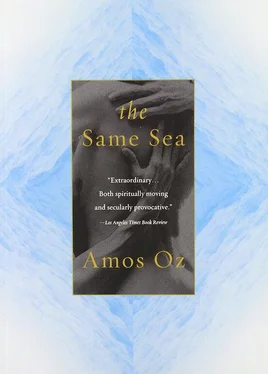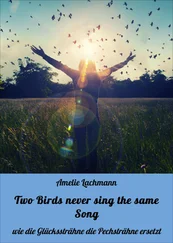a tray with a choice of feta or honey. He paced round the room,
then returned to the kitchen, and chopped some tomatoes to make
a salad so fine and well-seasoned, as though this would convince her
that he was right. He would not let her lift a finger to help him. He made
an omelette. Put the kettle on. Like a man in his element This surprised her,
because previously whenever they went out together to a café or the cinema
Albert had seemed so hesitant and unassertive. And now it emerged
that at home he did precisely what he wanted, and what he wanted was to do
everything himself. She touched his hand with her fingertip:
thank you. Its nice here.
Coffee. Biscuits. But how do you start on love on a rainy Saturday morning
like this, in a shabby room in old Bat Yam in the mid-Sixties?
(In the headlines in the paper on the kitchen table Nasser threatened
and Eshkol warned of the risk of escalation.) The light flickered. The room
was small. Nadia sat Albert faced her. Neither of them knew how to begin.
The would-be lover was a shy young man, who had only ever dreamed
of sleeping with a woman. He dreaded yet wanted it; he wanted it
but was deterred by a faint fear of bodily embarrassments.
His would-be partner, a reserved divorcee, lived in a room on a roof,
sewed for a living, her past was somewhat conventional. She
was no hind and he was no young hart. How and with what
do you begin to love? Nadia sat. Albert stood.
Outside it was raining again, the rain getting heavier, teeming down on rows
of dull grey shutters along the empty wet street; hammering on overturned
dustbins, polishing the panes in the tight-shut windows, pouring down
on rooftops, on forests of antennae trembling in the freezing wind that beat on zinc tubs hanging on grilles of kitchen balconies. And the gutters
grunted and choked like an old man sleeping fitfully. How do you start
love now? Nadia stood. Albert sat.
Through the wall from the next-door flat came the Saturday morning
program on the radio. A musical quiz. Nadia is here but where am I?
He tried to tell her some news from the office, not to break the thread
of the conversation. But the thread was no thread. She was waiting
and he was waiting for whatever would come at the end of the thread.
What would come? And who would make it come? She was embarrassed.
So was he. He kept on and on trying to explain something in economics.
Instead of words like credit side, debit side, Nadia heard, My sister,
my bride. And when he spoke of bulls and bears she translated, You have
doves' eyes. While he was talking she reached for a cushion, and Albert
trembled because on the way the warmth of her breast touched his back.
It's up to me to overcome his fear. What would a really experienced woman
do now in my place? She cut in: apparently, all of a sudden, she had a speck of dust in her eye. Or a fly. He bent over to get a good look. Now his face was close to her brow, she could clasp his temples with her hands, and at last lower his lips for a pleasing, teasing first kiss.
Two weeks later, in her room on the roof between two rainshowers, he asked
for her hand. He did not say, Be my wife, but instead: If you'll marry me
then I'll marry you. Because it was Nadia's second marriage they had a small,
intimate party, at her brother and sister-in-law's home, with a handful
of relatives and a few friends, and the elderly couple in whose flat
Albert lodged. After the ceremony and the party they took a taxi
to the Sharon Hotel. Albert undid the straining hooks one by one
down the back of her wedding dress. Then the bride turned out the light
and they both undressed modestly, in total darkness, on opposite sides
of the bed. They groped their way toward each other. She sensed
she would have to teach him: after all I presumably know
better than he does. It turned out however that shy Albert could teach her
something she neither knew nor imagined: the broad, flowing surge of joy
of one who was shy as long as the light was on but in the pitch dark
was insatiable. In the dark he entered into his own element.
No butterflies now and no tortoise at all, but like a hart panting for water
or a swallow for its nest. His chest to her back, and belly to belly, horse
and his rider and into every breach.
And what is hiding behind the story?
The fictional Narrator puts the cap back on his pen and pushes away the writing pad. He is tired. And his back aches. He asks himself how on earth he came to write such a story. Bulgarian, Bat Yam, written in verse and even, here and there, in rhyme. Now that his children have grown up and he has known the joy of grandchildren, and he has produced several books and traveled and lectured and been photographed, why should he suddenly return to versification? As in the bad old days of his youth when he used to run away at night to be all alone in the reading room on the edge of the kibbutz where he would cover page after page with jackals' howls. An acne-scarred, yellow-haired, angular boy forever swallowing insults, with his high-falutin talk arousing some ridicule and some pity, hanging around the girls' quarters, hoping that Gila or Tsila might want him to read them a poem he had just written. Naively imagining that a woman is acquired by a sermon or a verse. And indeed he sometimes managed to stir something inside those girls that later, in the night, accompanied them when they went to the woods to give and receive love, not with him but with burly haymakers who reaped with joy what he had sown with his words almost in tears. He is almost sixty, this Narrator, and he might sum it up roughly as follows: there is love and there is love. In the end everyone is left alone: those hairy haymakers, and Tsila, and Gila, and Bettine, and Albert, and even the Narrator in question. And he who is climbing mountains in Tibet and she who embroidered in the quiet of her bedroom. We go and we come, we see and we want until it is time to shut up and leave. And then silence. Born in Jerusalem lives in Arad looked around him and wanted this and that. Since he was a child he has heard, impatiently, time and again from Auntie Sonya, a woman who suffers, that we should be happy with what we have. We should always count our blessings. Now he finds himself at last quite close to this way of thinking. Whatever is here, the moon and the breeze, the glass of wine, the pen, words, a fan, the desk lamp, Schubert in the background, and the desk itself: a carpenter who died nine years ago worked hard to make you this desk so that you would remember that you didn't start from nothing. From starlight down to olives, or soap, from a thread to a shoelace, from a sheet to the autumn. It wouldn't be a bad thing to leave behind in return a few lines worthy of the name. All this is diminishing. Disintegrating. Fading. What has been is being gradually wrapped in pallor. Nadia and Rico, Dita, Albert, Stavros Evangelides the Greek who brought up the dead and then died himself. The Tibetan mountains will last for a while, as will the nights, and the sea. All the rivers flow into the sea, and the sea is silence silence silence. It's ten o'clock. Dogs are barking. Take up your pen and return to Bat Yam.
Dita is at the door. On her slender back a mountain of a backpack
with another bundle tied to it, clutching some plastic bags
and a handbag: she is seeking refuge, for a couple of days,
a week at most, if it's not an imposition. She's ended up with no flat
and no money, all her savings and everything gone; she found
Читать дальше












